Jane Roper's Blog, page 3
December 9, 2024
Books to give YOURSELF for the holidays
So, I was originally planning to write about my third post-election realization about how I want to move through the next four (or more) years in Trumpamerica. But it’s a complex topic, and I’m still working through how to express it. So I’m gonna hold off on it for now, and do a post about something way easier and more fun: BOOKS!!
One of my favorite parts of Thanksgiving and Christmas when I was a kid and young adult—pretty much right up to the point I had the damned kids—was reading. I relished having those days off from school or work to devour a good book. And when it was a fresh new one I’d gotten as a Christmas present? Hoo mama. That was the best.
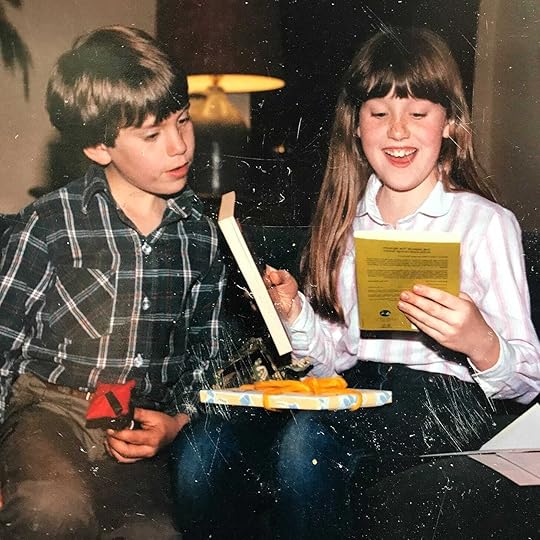 The author and her brother, circa 1985. I make that exact same face now when I receive books as gifts, except my teeth are better. I still have the same haircut, too.
The author and her brother, circa 1985. I make that exact same face now when I receive books as gifts, except my teeth are better. I still have the same haircut, too.But do I do that now? Over the recent Thanksgiving weekend, did I allow myself the luxury of sitting around reading for an hour or two on Friday or Saturday? Because that surely would be a nice thing to do, especially after hosting and cooking for ten people, no?
No! Of course I didn’t! Because there were dishes to be put away, and emails to get caught up on, and I had to squeeze in a run after all that pie and cheese and wine. Meanwhile, the shower in the upstairs bathroom was in desperate need of a good scrubbing, and oh god, look at all those smudges around the light switches and doorknobs.
Somehow, in between all the doing, I also managed to squeeze in some mini-breaks for social media scrolling and posting, and doing the NYT Spelling Bee puzzle. But did I take an hour to kick back on the window seat on the stairs with a cup of tea and a blanket and the excellent novel I’m currently reading? (The Many Mothers of Ivy Puddingstone, by Randy Susan Meyers.)
No. No, I did not. And I should have!! So I am vowing, right here and now, to take time to read on at least some of days I’m taking off before and after Christmas this year, and on Thanksgiving weekends in the years to come. And no, I don’t mean 30 minutes of reading right before bed, which I do most nights anyway. I’m talking good old-fashioned pre-house-and-kids-and-internet daytime reading.
I hereby order you (in bold type) to do the same. But not only that: I want you to buy yourself a book for the holidays. Or take one out of the library if you prefer. But, no, seriously. If you can swing it, buy yourself a damned book for the holidays this season.
Buy yourself that book that you’ve been wanting to read, or that spoke to you from one of the ten zillion best-of-the-year lists currently being published. You’re even allowed to take a break from the book you’re currently reading (if there is one) to read your shiny new holiday book if you like! I grant thee permission!
Buy the book at a bookstore if you can, because going to / supporting bookstores is awesome. But if you want to buy online, buy them by here, not the other place, so you can support local bookstores, ethical business practices, sustainability, and, well, me (I get a teeny kickback if you use this link, and any of the links below).
Not sure what to read? WELL. If you’re a fan of novels, I’ve got five delicious recommendations, complete with my signature non-star rating system. These are all books that I read this past year and thoroughly enjoyed. Click on any title to buy. And please feel free to add your own book recs. in the comments!
TLDR: Here’s the list on Bookshop.org, along with a few other recent favorites.
Night Watching by Tracy Sierra
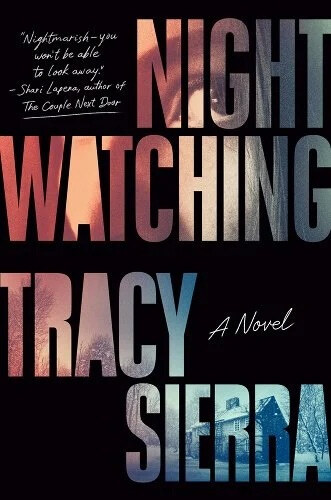
On one level, Night Watching is just an excellent thriller: An intruder comes into a woman’s secluded home in the middle of a snowstorm and she has to hide in a crawlspace with her children, then make a daring escape. There’s menace and mystery and psychological complexity and all that good stuff.
On another level, though, it’s about how women are often not believed—or are written off as crazy or deluded or “under stress”—when they report violence or violation. This book will drive you bonkers, in a good way, and keep you guessing. The perfect read if you’re snowed (or rained) in.
Rating: One disturbing-looking weapon, ten billion snowflakes, and a hashtag: #BelieveWomen
The Husbands, by Holly Gramazio
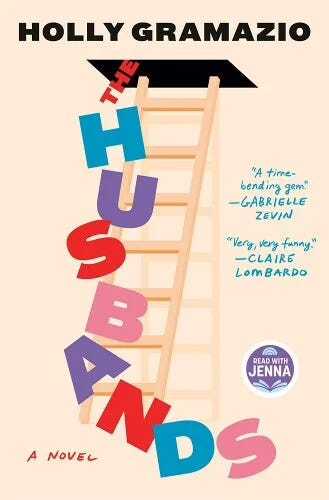
This one was quick and funny and original. A 30something woman named Lauren comes home one night to find a husband (her husband, apparently) in her apartment that she has no recollection of ever meeting, let alone marrying. When he goes into the attic to get something, the person who comes back down the ladder is a different husband altogether—again, a total stranger.
Over the course of the book hundreds (thousands?) of husbands appear and disappear as Lauren tries to figure out what the hell is going on and considers what makes marriages work (or not), the role of fate versus choice when it comes to love, and whether it’s worth waiting for the “perfect” partner, or accepting that perhaps nobody really is.
Rating: Infinite penises
Americanah, by Chimamanda Ngozi Adichie

There is so much story packed into this book! It’s bout two young Nigerians, Ifemelu and Obinze, who are very much in love, but choose different paths after university: She goes to America, where she discovers that being Black there is an entirely different reality from being Black in Nigeria (where “being Black” is next to irrelevant). Obinze, meanwhile, heads for London, undocumented and living on the fringes.
To be honest, I didn’t love this book, but I think it’s in part because I read it in fits and starts, during a rather stressful stretch of life (including a certain election). Some of the befuddled white American characters come off as caricatures, and it felt a bit long to me. BUT it has really stayed with me and I expect it will continue to—it was funny and sad and gorgeously written and I appreciated what it revealed about Nigerian culture and class and the experience of being an African abroad.
Rating: Three hours sitting in a salon, two passports, and one home-cooked meal.
The River, by Peter Heller
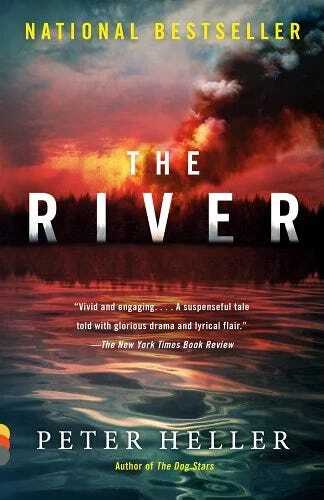
Peter Heller, hello!! I am so glad to have rediscovered you! I read Heller’s book The Dog Stars ages ago, being a MAJOR sucker for a good post-apocalypic or dystopian read, but for some reason it took me more than a decade to check out another one of his books. I’m so glad I did. The River is a combination thriller and wilderness survival tale with a tender male friendship at its heart.
Two college students, Wynn and Jack, set off on a long paddling trip in the Canadian wilderness that quickly turns perilous. There’s a wildfire, a possible murder, and some shady drunk fishermen, among other things. And, as in any good wilderness adventure, they lose a good chunk of their gear and food at one point, and have to figure out how to survive without it. I can’t get enough of that shit, man. (And if you can’t either, I highly recommend another kickass wilderness thriller, The River at Night, by Erica Ferencik.)
Rating: A whole lotta granola bars
Big Swiss, by Jen Beagin
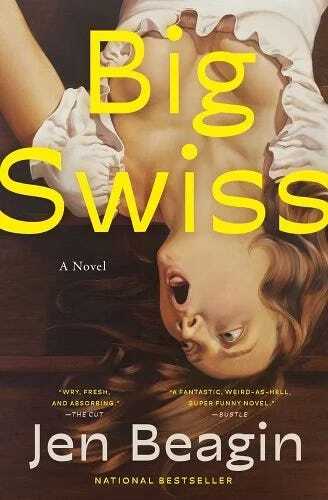
Friends, I think this was my favorite book I read this year. It’s is messy and sexy and hilarious and completely wackadoo. A forty-something, emotionally stunted woman named Greta with a traumatic past that she’s never really dealt with lives in a ramshackle, bee-filled house in a Hudson Valley town with her bohemian roommate and transcribes therapy sessions for a sex therapist who calls himself Om. She ends up becoming obsessed with and then having a passionate and extremely erotic affair with one of his clients, a repressed, married woman that Greta refers to as “Big Swiss”—who has no idea that Greta has heard recordings of her therapy sessions.
This is definitely a love-it-or-hate-it kind of book. To quote one Goodreads reviewer: “my favorite genre is literary fiction about messed up women doing crazy sh*t.” YES! If you’re not into that kind of thing, don’t pick this one up. Or All Fours, either — another one of my favorite reads this year. I didn’t include it here because it is already on EVERY list. (And maybe don’t read my book. Or the next one I’m writing. Ha!)
Rating: Two donkeys, a spanking, and a great many bees
Bonus Book List: Hey, I know these people!
I’m part of a wonderful community of writers here in the Boston area, some of whom are dear friends. A bunch of my writer pals had novels or story collections come out in 2024, some of which I’ve read, and some of which I am dying to. I put together a list of them on Bookshop. (Most but not all are pictured in the graphic below, which is generated randomly each time you visit the page.) Boston writer friends, if I missed your book, I’m sorry! Let me know and I’ll add you!

BTW, I really appreciated the fact that after my last blog post a few folks upgraded to paid subscriptions. As someone who makes their living as a writer (and would, frankly, love to spend less time on corporate copywriting and more time on fiction / humor / essay writing) I am truly grateful. But I love my free subscribers too, and am so glad you are here! It’s all good!
Happy holidays. Now go buy yourself a book.
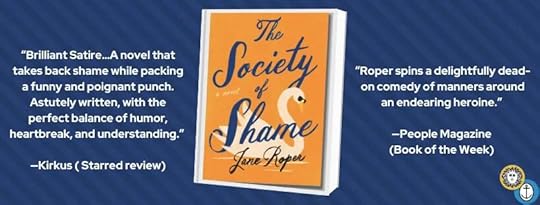
November 20, 2024
It's different this time around.
Good morning, America, how are you?
As for me, other than the fact that the condition of my middle-aged neck continues to deteriorate, my right eye is occasionally doing weird, janky vision things, and 76 million people think Trump will make a swell president, I’m doing pretty well.
I almost wrote a post here just a few days after that very bad election—you know the one—but I’m glad I didn’t.
Almost two weeks on, I’ve had some time to reflect, and go through various fluctuations of dismay / anger / disbelief / sorrow / nostalgia / frustration etc. (I am still going through them, mind you.) And three things have become pretty clear to me in the process, in terms of how I plan move through this next era in the American experiment.
First realization: I refuse to carry all of this around with me all the time.
This one came on pretty quickly—even in those first miserable 24 hours, when I was still feeling shaky and nauseated, unable to move at full speed. (Literally! Grief throws my body for a big ole loop.) And it was this: I cannot and will not let the crazy and chaos and destructiveness of the Trump 2.0 government—which is already in process, with his clown car of cabinet nominees—dominate my focus for the next four or eight or forty years.
The first time Trump was in office, I spent way too much time following the news, doomscrolling, and posting on social media. This time—forget it. I don’t know if it’s because I’m older and wiser or more jaded or what. Maybe it’s just because this MAGA-infested version of American politics has been going on for eight years now, and I’m just fucking tired.
In any case, I’m less like this:

And more like this:

My time and energy are precious commodities, and I would much rather use them to read, write, be outdoors, make and eat good food, spend time with my friends and family, and engage with my community than gape in horror at Trumpster fires. (Get it? Like dumpster fires, but with Trump? Never mind.) Bette Davis wouldn’t waste her time perseverating on that bullshit, and neither shall I.
But I’m also aware that my ability to make this choice is a privilege that may not be afforded to those who could be directly affected by the policies and zeitgeist of a Trump administration: Immigrants. People of color. LGBTQ folks. Women being refused the medical care they need. People who need healthcare or food assistance that might get axed by that billionaire fuckwad Musk.
So I do not intend to put my head in the sand and turn completely inward. I will continue (and step-up, I hope) the volunteering and activism I do on a local level. I will keep donating to important causes, particularly the ones I feel will help protect civil liberties, the environment, and the most vulnerable people in our society. I will even keep writing those damned get-out-the-vote postcards if I must. (I must.)
But I will not let myself be completely consumed by all the things I cannot control. To that end, I’m cutting my news and hot-take and punditry consumption waaaaay back, and trying to limit social media, too.
Speaking of which: I swear, if I read another OH MY GOD, LOOK WHAT THEY’VE DONE NOW!! post in my feeds, I’m gonna freaking lose it. (Note that I did a lot of posting along these lines during Trump 1.0.) I get the need to vent and commiserate, but at some point it becomes self indulgent. And, if you’ve been paying attention for the last eight years, none of what’s happening, or about to happen, should come as a surprise. So next time you’re tempted to tell the world that you’re aghast, maybe fire off a donation to the ACLU (or your organization of choice) or put in a call to your senator instead. Volunteer at a local food pantry. Smile at a stranger. And then go read a good book.
On that note, here comes….
Realization number two: Art, baby. Art.
This isn’t actually a new realization. It’s the same sentiment I posted the day after the election in 2016.

But I feel it even more strongly now. Because in the very worst of times, art—by which I mean poetry, prose, visual art, theater, film, music, magic, dance, and, OK, fine, puppetry—has the power to move, inspire, challenge, educate, distract, disturb (puppets), delight, and remind us how amazing human beings can be.
This is why there’s a traveling Shakespeare troupe roaming a post-apocalyptic America in Station Eleven. It’s why my great uncle tap-danced and did magic for his fellow GIs in the Pacific Theater during World War II. It’s why, two days after the election, I brushed myself off and got back to work on my novel.
 My Uncle Jack was totally hot. He also totally would have voted for Trump.
My Uncle Jack was totally hot. He also totally would have voted for Trump.Art also slings tiny bridges across the chasm between peoples’s worldviews and political persuasions. Admittedly, this can be confounding; like, how is it possible that the person standing next to me in the museum admiring the fierce beauty of a Van Gogh could also vote for a guy who says Haitian immigrants eat dogs and cats, mocks disabled reporters, calls neo-nazis “fine people,” and tried to overturn an election? It’s hard to get one’s head around. And yet…and yet…there it is. We contain multitudes. And maybe finding common ground through art can, in some small way, help us heal as a nation. Maybe.
At the risk of sounding completely obnoxious, I will add that as a writer I feel called this time around in a way I didn’t before—as do a lot of other creators I know and love. I feel called not just to keep telling stories, both fictional and true, but to vigorously champion other people’s stories. (Just not, you know, that guy’s stories.)
This quote from Toni Morrison, which has been making its way around the internets among writers sums it up:
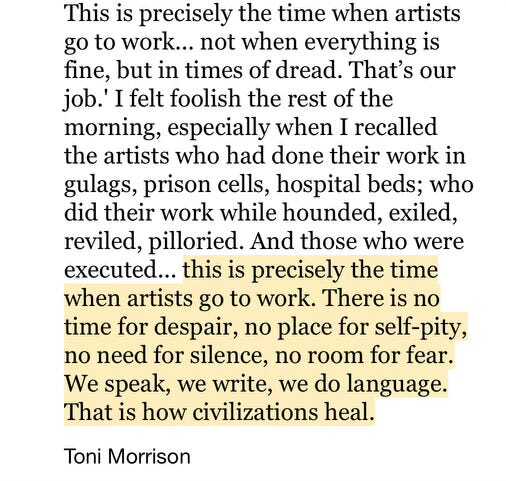
I also love the way one of my favorite Substackers, Lyz Lenz, put it.
Find the stories and the storytellers you want to support. Find the places making the art that you love and that crystallize a vision for a better place. Be rabid about the world you want and help to make it. I’ll be out there doing my best to do it too.
Same, girl. Same.
This brings me to a new realization: That I should save realization three for another post. Because that was a really good note to end on (of course now I’ve ruined it) and this post is already long enough. Also, some of you—you know who you are—you may need time to recover from the mention of puppets.
Take good care of yourselves and each other. And thanks more than ever for reading.
Finally, a message from your author: All posts on Jane’s Calamity are free and publicly available, but writing is how I make my living. If my work is meaningful or comforting or entertaining to you, please consider upgrading to a paid subscription (it’s less than $5 a month, Cheap!). Or, hey, buy my book! And thank you.
 Me doing my best Fraulein Maria impression near the hilltop where The Sound of Music was filmed. Through all the tumult and the strife, how can I keep from singing? (And twirling)
Me doing my best Fraulein Maria impression near the hilltop where The Sound of Music was filmed. Through all the tumult and the strife, how can I keep from singing? (And twirling)

November 4, 2024
5 fun things to take your mind off the election
I got up this morning with every intention of getting in a few good hours of writing, but I couldn’t for the life of me concentrate. I’d write a few words or sentences and then take a break to Google stupid things like “who will win the election?” and then scary things like “civil unrest if Trump loses?” (I’m afraid it’s nearly guaranteed.)
Then, to take my mind off that, I’d do something fun like scrounging around on eBay for a discontinued Bare Minerals foundation stick that I love. (I found one! And in the right color! Hurray for consumerism, rescuing me in my time of need!)
I managed to get a little day job work in, and a quick run, but now the day is basically over. After I’m done with this Substack, I’m going to do some phone banking for the Democrats.
My pal Jenna Blum and I made calls on Saturday, and it was not nearly as scary as I feared it would be, in part because we were mostly calling people who had registered for Harris/Walz rallies, to confirm that they were attending. It’s actually kind of therapeutic to make these calls, because so many people are so lovely, and so fired up to vote. And you feel like you’re doing something at least. (My efforts even managed to guilt/inspire my grumpy husband to pick up a shift.)
jenna_blum A post shared by @jenna_blum
A post shared by @jenna_blumIt’s not too late to make calls yourself. (You can even do it on Election Day.) You’ll be calling likely Democratic voters, not trying to convince Republicans not to vote for fascism. I mean, for Trump. You can even just do a few calls and bail if you hate it.
But this post is not (entirely) an exhortation to volunteer last minute. In the interest of providing a bit of diversion at this most anxious time (there’s a meme going around likening it to waiting for a biopsy to come back), I thought I’d pull together a few fun sources of distraction, at the risk of revealing what a total cheeseball I am.
A Majestic Dragon
Back in the early 2000s, in case you missed it— maybe because you were too busy trying to figure out how to use your Blackberry or wondering if the new “Facebook” thing would catch on—there was a truly weird and wonderful short animation series online called Homestar Runner. One of the recurring segments featured a character named StrongBad answering his fan emails. The most legendary one is the one where he teaches viewers (and others) how to draw a dragon. But not just any dragon: Trogdor the Burninator. Guard your thatched roof cottages—and ballot boxes—because he’s on his way.
Iguana vs. Snakes
Before Snoop Dogg was hanging out at the olympics talking about dressage and getting stoned with Martha Stewart, he was occasionally hosting the “Plizzanet Earth” segment on the Jimmy Kimmel show. This episode, featuring a shit-ton of snakes, makes me laugh every time. And almost never makes me think that the snakes vaguely resemble an angry mob of the sort that might storm a government building if their candidate loses.
Denise, the receptionist in Heaven
Former Miss New York Taryn Delanie Smith makes videos where she plays Denise, the receptionist in heaven, and they are a damned delight. Follow her on Instagram (or TikTok if that’s your thing — it’s not mine because I am old) and go way down this charming rabbit hole. Mostly the videos are funny, but sometimes she does special request ones for people who have lost loved ones and they are sad and sweet and lovely. She almost makes you forget that there are millions of people who are OK voting for a convicted sex criminal who jokes about shooting journalists and political rivals and calls undocumented immigrants “monsters” and “vermin,” because they think somehow his winning will make eggs cheaper.
taryndelaniesmith A post shared by @taryndelaniesmith
A post shared by @taryndelaniesmithAn America-themed joke:
Knock knock.
Who’s there?
Abraham Lincoln.
Abraham Lincoln, who?
What, you’ve never heard of me?
I’m not sure if this joke is actually funny, but it’s a family favorite. Whatever you do, don’t try to imagine the look of horror that would appear on Abraham Lincoln’s long, bearded face if he read a transcript of any given rally speech by Donald Trump and was then told that this man had not only been president once, but might well become president again.
Decorative Gourds
One of the scenes in my novel-in-progress that I did manage to work on a little bit today involves a cornucopia full of decorative gourds. I had to work gourds into my book somehow, because what kind of motherfucker doesn’t like them? Take a minute to read the original decorative gourd masterpiece—even if you’ve read it a thousand times before.
And then, if you feel just a little too cheerful after that, hop over to my former blogging home and read the parody I did of the piece six Novembers ago, right around the time of the Bret Kavanaugh hearings and midterm elections, It’s Smash the Patriarchy Season, Motherfuckers. Don’t worry. It’s no longer relevant at ALL! Nope. Not a bit.

Welp. I may not have completely succeeded in the whole distract and divert thing, for you or myself, but it was worth a try.
And now, I’m off to make calls.
See you on the other side, my friends.
All posts on Jane’s Calamity are free and publicly available, but writing is how I make my living. If you enjoy my strange brand of Substacking, please consider upgrading to a paid subscription. Or, hey, buy my book!

October 24, 2024
Peeing outside: The secret to productivity?
Hoo boy! It’s been a minute. The last few weeks have been jam-packed—a jaunt to the Writer’s Digest Conference in Cincinnati to teach sessions on memoir and humorous fiction, a ton of day job work, and lots of family stuff (our twin kiddos are in the thick of college applications; also, there have been funerals)—and as a result, I haven’t been able to find time to write here, let alone work on my novel in progress.
But now that I can finally catch my breath, I’m back here on the ‘Stack, and back to plucking away at my novel. I got a HUGE burst of momentum on that second item at the beginning of the month, when I had the great pleasure of spending five nights at an Airbnb in Western Massachusett for a solo retreat. This is the first time since my last retreat in June—the one among the woodland creatures and men on boats with their dicks out—that I’ve gotten away to write. As usual, it was incredibly productive.
When I got home, one of my kiddos wanted to know what, exactly, I *did* while I was out there. Like, did I literally just write all day?
So, this post is for that beloved child. And, because I only have so much longer to embarrass my children at close proximity, I’m going to make it as cringe as possible by including details about the bathroom situation. Then I’m going to share the post on Instagram, where several of her friends follow me. And maybe I’ll text a link to her boyfriend. And email it to some of her teachers. BWAH HA HA!! Slay.
Note that the below is sort of an amalgam of the four full days I spent on retreat, all of which were quite similar. To set the scene, here is the picture of the amazing Airbnb I stayed in—a little cottage tucked away on the property of a farm. No cell phone signal, no wifi, just beauty and quiet.

7:00 am — Wake up! Did you think I would laze around in bed, given that I have all day to write? Certainly not. Time is of the essence! However, I do take a little time to gaze out the window of the sleeping loft at the beautiful, misty meadow outside in hopes of seeing a deer or fox or something bounding bucolically across it. No luck.
7:10 — Decision point: There is no bathroom in the cottage (but there is a little kitchen area with a sink, so my tooth brushing and face washing needs are covered). Do I A.) I throw on a jacket and flip flops and make the walk down to the barn where the bathroom is, or B.) take advantage of the great outdoors? There is a lovely mist rising from the meadow, and also I am lazy. The answer is B.
7: 30 — I’ve got my coffee and toast with peanut butter and I’m sitting at the table in front of the giant window overlooking the meadow, still hoping to see some charismatic fauna. Seeing none, I return to the acrostic I’ve been working on. A better person than me would probably be freewriting in a notebook to get their creative juices flowing. But me, I’m trying to remember the name of Demi Moore’s co-star in The Scarlet Letter.
8:00 — OK, enough of that. I open up my laptop, open Scrivener, and re-read a scene I wrote the the day before to get things rolling.
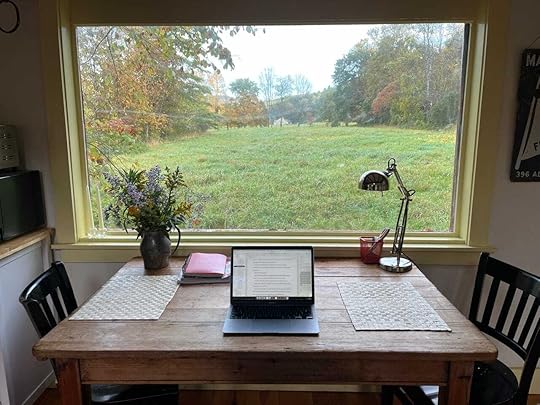
8:01 — Fuck. This is terrible. Cut and paste the entire thing into my “Deleted but not forgotten” folder.
9:00 — Having rewritten the scene I just deleted, I realize that the original version was actually better. Copy and paste it back into the document and keep writing. Now we’re cookin’ with gas!
10:30 — I’ve had a lot of coffee by now. Time to visit the meadow again. Actually, wait. Let’s take the walk to the bathroom.
10:35 — I can get wifi in the bathroom, and the texts come pinging in:
Mom, can I take the car tonight to go to Santa Fe Burrito with my friends? (Child, I am in Western Mass. Ask your father.)
etc.
Sorry to text, I know you’re on PTO - are you free to go over the website copy w. the client at 10:00 am Monday?
I resist the urge to look up Demi Moore’s co-star.
10:45 — Back at the table, internet-free, thank God.
10:50 — Go back to an earlier chapter of the book and fill in some new details about my main character that I just figured out.
10:51 — This book is so bad. WTF am I even doing? Stand up and stretch and make an cranky sort of groan of despair/creakiness.
10:52 — Ooh, is that a deer? Right there at the edge of the—oh. No. It’s just a fallen tree.
12:04 — Word count: 1,823. About three times what I normally write on your average weekday, and it’s not even noon. Hot damn!! Maybe I actually will finish this first draft within a few months!
12:15 - Back in the bathroom with the wifi, I start looking at my calendar and figure out when I can do another retreat. Start searching for Airbnbs.
12:45 - Avocado toast with lox, a Green Cola, baby carrots, a clementine, and some more acrostic-ing. I’ve got G_______A_ now. Gina…? George…? Dammit.
1:00 - Reading counts as work when you’re a writer! Grab my book from the sleeping loft, lie down on the couch with the sun coming through the window, planning to read for a nice long…..zzzzzzzzz.
2:30 — I’m woken up by the sound of something scrambling around underneath the cottage. Squirrels? Baby foxes? I hope it’s baby foxes! I go outside and peek underneath the cottage, but there are no baby foxes.
I change into running gear, then hit the country roads for a long run/walk. It is gorgeous out here. Fields and woods and brooks and farms and old houses and even older cemetaries. Tons of apple orchards. Occasional artsiness/hippiness (sculptures and prayer flags and whatnot) interspersed with occasional Trumpiness (Trump flags and signs denigrating liberals and whatnot). Still no good wildlife. But cows. And lots of birds. While I’m walking, I figure out how to solve a chronology issue in the book that I’ve been wrestling with. I almost always make writing breakthroughs, whether tiny or enormous, while I’m walking or hiking. Note that both of these activities also may involve peeing outside. COINCIDENCE?
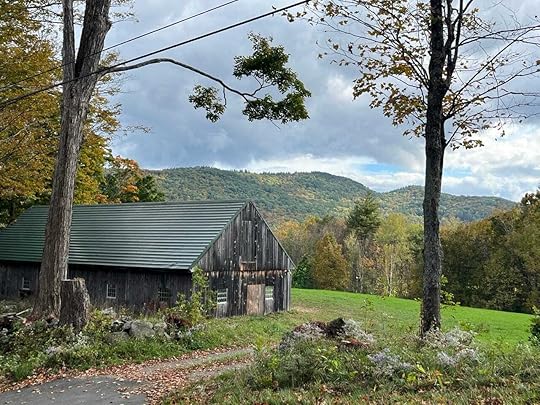
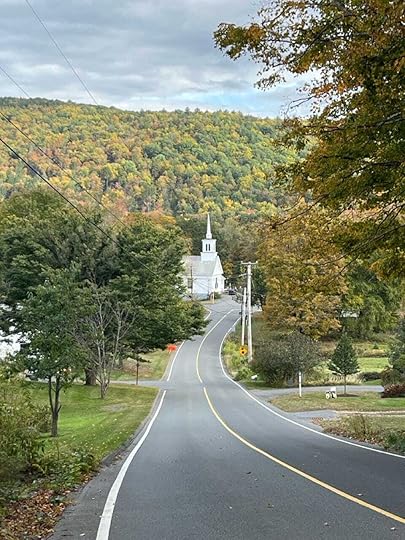

4:30 — Back at the cottage. Sit back down, ready to bang out another few hundred words, maybe even a thousand, if I can. Late afternoon is when I get my second burst of writing momentum. I read the note I left to myself in the open document before I broke for lunch: Next, write the scene where she tells her brother what’s going on.
4:33 — Ugh. I don’t want to write that scene. Does this mean that it’s not what the next scene should be? If you’re bored, doesn’t that mean your reader will be bored, too? Yes, maybe instead I should—ooh! Is that a deer?? No. It is not a deer. It is the same fallen tree I thought was a deer before.
5:00 - Hello, meadow, my old friend. I’ve come to crouch in you again.
5:45 — I’ve figured out how to make the brother conversation scene not boring—basically by adding funny dialogue to entertain myself—and it’s going swimmingly. You know what would be nice right about now? A nice big glass of sauv. blanc and some Skinny-pop cheddar popcorn, that’s what.
7:15 — Quittin’ time! Eat some of the rotisserie chicken in the fridge, along with a salad from one of those handy kits where the dressing has more sugar than your average cupcake. Final word count for the day: 2,301—but that doesn’t include all the stuff I wrote and then relegated to the Deleted But Not Forgotten folder, or the backfilling and revising I did in older chapters.
Feel briefly wistful and frustrated. Why can’t I manage to be even half as productive at home? Should I get up at 4 am instead of 6:30 am? Should I erect a little writing shed in my yard? Pee exclusively in the woods behind our house? Or should I leave my family take up permanent residence in this cottage, if the owners are amenable? (I might want to add a bathroom if I did that.)
7:30 ish - Lie on the couch and watch one of the movies I wisely downloaded before I left home. Maybe eat a little bit o’ chocolate.
9:45 - Get in jammies and ascend to the sleeping loft, planning to read for a good solid hour, but konk out after twenty minutes.

12:42 am — Be woken up by whatever animal(s) are squeaking and scrabbling around under the cottage (I’m still hoping it’s baby foxes, but I will never know for sure) and then lie there for a while trying to talk my bladder out of being full, as if somehow I can avoid doing the thing I must do next: down the ladder, and out into the meadow once more. Since we’re out in the country, the sky is very dark and brimming with stars. If there was a bathroom in the cottage, I might never have seen them. Or heard the owls hooting in the woods.
7:00 am — Wakey wakey! As I lounge in bed for a few minutes, contemplating my good fortune, considering once again whether to use the bathroom or the meadow, and hoping for wildlife, it finally comes to me: Demi Moore’s co-star in The Scarlet Letter was Gary Oldman.
Let the day begin.
All posts on Jane’s Calamity are free and publicly available, but writing is how I make my living. If you enjoy my strange brand of Substacking, and/or if you’d like to help me pay for my Airbnb writing/peeing retreats, please consider upgrading to a paid subscription. Or, hey, buy my book!
P.S. I recently got the very exciting news that The Society of Shame is a semi-finalist for the Thurber Prize in American Humor in Writing. What an honor to be in such talented company! Speaking of which: I loved meeting a previous Thurber Prize winner, the wonderful Steven Rowley, (The Guncle, The Celebrants, Lily and the Octopus) at the Writer’s Digest conference last week. Naturally, we reveled in our hilariousness together at sunset, as one does.

P.P.S. To my kids and, really, all of you: Sorry about all the peeing stuff. It won’t happen again.
September 25, 2024
Zen and the Art of Market Basket
I am not a fan of crowded and chaotic situations. Being herded through customs or security checkpoints at airports, exiting or entering shows and sporting events, attempting to get a table at a restaurant with a large group of people and no reservation—these things all make me feel like I can’t quite get enough oxygen in my lungs and temporarily hate being human.
But the older I get, the better I find I am at remaining patient, detached, and even serene in these situations. I think it’s because I’ve gotten much better over time at accepting my absolute powerlessness in the face of…well, pretty much everything.
I also have a practice—a workout routine, if you will—to help me strengthen my ability to remain placid in the midst of chaos and the unrelenting crush of humanity:
I shop at the Chelsea, Massachusetts Market Basket.

If you don’t live in eastern New England, then you may not have had the singular experience of grocery shopping at a Market Basket. (Or, DeMoula’s, if you’re old school.) And that experience is, in a word, crowded.
This is mainly because Market Basket is much, much cheaper than the other supermarkets around—Stop & Shop, Shaw’s, Star, Hannaford, Trader Joe’s*, etc.—and has incredible selection and availability. You can get all of your standard American supermarket fare—like, all of it: a dozen brands of tomato sauce, twenty different kinds of yogurt, seven-thousand kinds of breakfast cereal—as well as some of the bougie stuff—Bob’s Red Mill organic quinoa, Annie’s overpriced mac and cheese, Jeff and whoever’s free-range eggs, etc. Plus baked goods, prepared foods, and generic products galore.
Each Market Basket store also carries an immense selection of items that cater to the local immigrant populations. Do you need taro? Beef or pork feet? Chinese mustard greens? Haitian soup mix? A very particular type of cheese from El Salvador? Market Basket is the place for you. (Void in New Hampshire locations.)
 This entire display case is dairy products from Latin America.
This entire display case is dairy products from Latin America.
 Technically they’re cow feet.
Technically they’re cow feet. But with all this selection and such fabulous prices ($2.50 for Wheat Thins! CAN YOU EVEN?) you’re going to have to navigate your way around lots of other people and their shopping carts. You’re also going to have to get around the staff constantly restocking the shelves. It’s nearly impossible to find a Market Basket aisle that doesn’t have at least one employee unpacking boxes. And speaking of aisles, in some store locations they are maddeningly narrow. (I’m looking at you, Somerville.)
When I was younger and less enlightened—like, three years ago—I used to avoid Market Basket like the plague. I could not deal with the traffic jams and sensory overload. I was willing to pay a little more for the more refined shopping experience that is Stop & Shop. But with inflation and price gouging sending grocery prices sky high, I started occasionally venturing to Market Baskets, albeit with gritted teeth and a racing pulse. I would leaving feel drained.
It was my good pal Marah who helped me change my entire attitude toward the Market Basket shopping experience. She was and is a big fan of the (immense) Chelsea Market Basket, which is near the rock gym where we climb together. She told me that her secret to survival is to go in with the right frame of mind, knowing that, yes, it will be crowded and congested and overwhelming, and choosing to accept that fact and just be present, letting it all wash over you as you appreciate the grand pageant of humanity.
The grand pageant of humanity!
Indeed, that is the beauty of the Chelsea, Massachusetts Market Basket. (And many other locations. Void in New Hampshire.) You will see people of every size, shape, race, class, age, and ethnicity. You will see women in hijabs and/or Patagonia fleece and men in dashikis and/or Vietnam Veteran caps. You will see people from every Spanish-speaking country in the world, with the possible exception of Spain. (Two-thirds of the population of Chelsea is of Latin American origin.)
As you make your way through the store, you will see old people, young people, babies, children, and beings you suspect are not of this realm. You will see people who are completely oblivious to everyone around them, who park their cart dead-center in the middle of one of the aisle and completely block the flow of traffic while they stand scrutinizing the vast Goya bean selection. You will see people who do not share your notion of what constitutes an appropriate amount of personal space. You might even see someone taking pictures of the Beef Feet.
You will also encounter people who seem to be truly enjoying themselves. Or who are at least more or less neutrally content. People who are definitely not freaking the fuck out at the sheer chaos of it all.
One of those people COULD BE YOU! Like my wise friend said, the secret at Market Basket is to accept what is and focus on the wonder of it all: the people, the bounty, and the mulitcultural miracle that is America.
Also, while you’re there, be sure to appreciate the the well-oiled machine that is the Market Basket workforce: Efficient, polite, spiffy. The boys and men are all required to wear ties, the women at the registers are paragons of productivity, and the checkout lines move at an impressive clip. If anyone loathes their job, they hide it well. (The company is, apparently, very good to its employees well, which probably has something to do with their overall pleasantness; in fact, ten years ago, Market Basket employees throughout the region went on strike when the Board of Directors tried to oust the beloved CEO.)
The other secret to Market Basket survival is to keep your breath steady and for God’s sake keep things in perspective—especially in the produce section. Navigating this part of a Market Basket (any Market Basket, even in New Hampshire) is kind of like being in a game of Pac Man, but if there were leafy greens and twenty times as many ghosts. But not ghosts that want to kill you; just ghosts that have a tendency to get between you and the cilantro—which is their goddamned right. You just have to wait your turn. Breathe. It’s all good.
 The produce section. Deep breaths.
The produce section. Deep breaths.Same goes when you’re trying to maneuver between carts in a crowded aisle. Let yourself be bemused by the craziness of it all! Smile! Nine times out of ten, the person you’re doing the you-go-no-you-go cart dance with, or who you almost plow into coming out of the toilet paper aisle, will smile back. Tensions dissipate. Cultural differences melt away. The outside world in all its strife and division is gone. There is nothing but this vast food wonderland, and all of us here being human together, trying to get past the employee restocking the Maruchan Instant Lunch.
It’s all going to be OK.
 I’ve puzzled over this sign many times, trying to figure out what, exactly, “Ethnic Foods” means in this context. Also: I had no idea there was a substantial Bosnian community in Chelsea, but apparently there is? Or maybe Bosnian groceries are just particularly awesome and I’ve been missing out. Must try some next time.
I’ve puzzled over this sign many times, trying to figure out what, exactly, “Ethnic Foods” means in this context. Also: I had no idea there was a substantial Bosnian community in Chelsea, but apparently there is? Or maybe Bosnian groceries are just particularly awesome and I’ve been missing out. Must try some next time.So there you have it. I never would have thought I would come to appreciate (and enjoy) my Market Basket forays as much as I do, and I certainly didn’t think they would become a quasi-spiritual practice. But I honestly think they are helping me become a better person. Or, at least, a more patient and even-keeled one. Most of the time.
See you in the produce section.
All posts on Jane’s Calamity are free and publicly available, but writing is how I make my living. If you enjoy my strange brand of Substacking, and/or if you’d like to support my Market Basket habit, please consider upgrading to a paid subscription. Or, hey, buy my book!
P.S. I am not alone in my love of Market Basket. It’s sort of a thing in the Greater Boston Area and beyond. See below from a January post from Boston.com (I’m guilty of the seventh item, clearly) and check out the People of Market Basket Facebook page for some excellent local flavor, including Massholes arguing about politics in the comments.
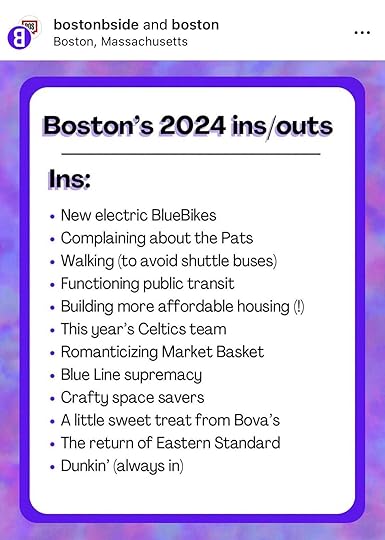
P.P.S. Here’s another post about me attempting (but in this case failing at) mindfulness, and why I’d be a terrible Buddhist monk.
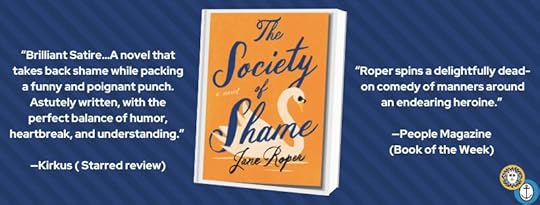
*Trader Joe’s is not a real supermarket.
September 4, 2024
I don't love you anymore, September
The end of summer / beginning of Fall (in the back-to-school sense) has always been my favorite time of year. The days are still warm, but visions of Fall foliage, decorative gourds, and fun-size Butterfingers glimmer in the distance. I feel somewhat wistful and nostalgic, but also jazzed up to dive back into the routine of school and work and new projects. The nights are cool, I feel less bloated, and life is good.
This year, however, I’m struggling to tap into that ole Steptember magic. It’s the start of our (twin) kids’ last year at home before they fly off to college, and I’m feeling it BIGTIME.
The last year of school plays in the auditorium and permission slips and fundraisers.
The last year of a crowded kitchen in the morning and family dinners at night and “any good goss at school today? Spill the tea!” (Pro tip: Teens LOVE it when you use their slang!)
The last year of their shoes scattered all over the front hall, their coats on the rack, and the light shining from the gaps beneath their bedroom doors at night.
I don’t quite know how to fully appreciate and enjoy this last year without at the same time feeling a sense of impending grief. Maybe it’s impossible.
And yes, I know, kids come home on breaks and for summers. They sometimes boomerang back between jobs and during the odd pandemic. God willing, they will never go away completely.
But it’s not the same.
So I will not be making things worse on myself by reading Charlotte’s Web this Fall. But this is a reminder for long-time readers and a PSA for new subscribers that YOU should. The post below—originally published last September, and perhaps to be shared again next September, when I am a puddle of misery—explains why.
Maybe don’t read it if you’ve got a high school senior or two in your house, or have a newly empty or half-empty nest. In that case, just join me in feeling sad and possibly picking up a bag of those fun-size, Halloween Butterfingers (which have been in stores for weeks because America) and eating three or nine of them in front of the TV after downing a can(nabis) of seltzer or two. It’ll be fun!
The rest of you, start reading.
I’ll be back next week with something funnier and more uplifting, I promise.
Spiders, Pigs, and the Circle of LifeThis time of year—back to school, back to the routine, on the cusp of Fall—Charlotte’s Web is often on my mind.
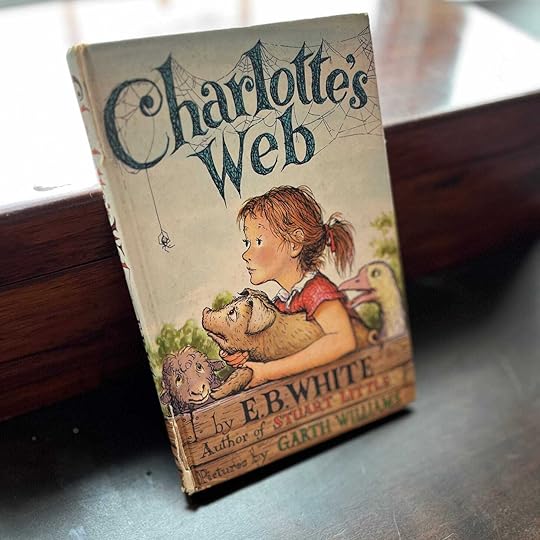
I suppose it’s slightly odd that I love Charlotte’s Web so much, given my complicated feelings about spiders. If you ever happen to ask me how I feel about them (as one does), I will say that I don’t particularly like spiders—especially hairy ones, which can go fuck themselves—but I do respect them.
They really are remarkable creatures: the webs, the dexterity, the mad hunting skills, the silk balloons they spin to take flight. One of my favorite activities at Sandy Island, the YMCA family camp on Lake Winnipesaukee we go to at the tail end of every August, is spider watching. (This is not an official, organized activity; it’s just a thing I do.)
The best place for this is the mini-lavs, where spiders set up camp in the upper corners and prey on the bugs that squeeze in through the gaps over the doors or holes in the high screen windows, attracted by the light. Believe me, you haven’t lived until you’ve watched a spider sprinting toward a bug just caught in her web, stunning it into submission, and expertly rolling it into little white spider cigar, all while brushing your teeth.
Well, maybe you have.
You also see lots of spider egg sacs up in the crooks and corners of the lavs and other buildings and porches on the island. And slow, tired spiders, who seem like they’ve seen better days. Some newly dead spiders, too.
If you’ve read Charlotte’s Web, none of this will come as a suprise to you. In that book we learn, along with Wilbur the terrific / radiant / humble pig, that as Fall approaches, common orb weaving spiders like Charlotte, and like my spider pals in New Hampshire, lay their eggs. Not long after that, they die. One life ends and hundreds of new ones begin. Every year, the cycle repeats.
And every year, our (non-spider) family goes back to Sandy Island, and does the same things, sees the same people. Every year, we come back home on Labor Day weekend, to the start of a new year. (Yes, September is the new year. January is a sham.) The kids go back to school. I refocus on my work and routine. We relish the sunny days and cool nights. We slaughter the pigs.
But every year, the kids are a little older, and so are we—a reminder that life isn’t a really a carousel of time, but a corkscrew. We come back around, but never to the exact same place. That fact is never as achingly apparent as when the back to school and off to college photos fill your social media feeds.
There’s a melancholy to this time of year, a sense of impending loss. But it makes you appreciate the pleasures of the season—of everything—that much more. I think this is why so many people, myself included, consider Fall their favorite season.
The dying leaves are breathtaking.
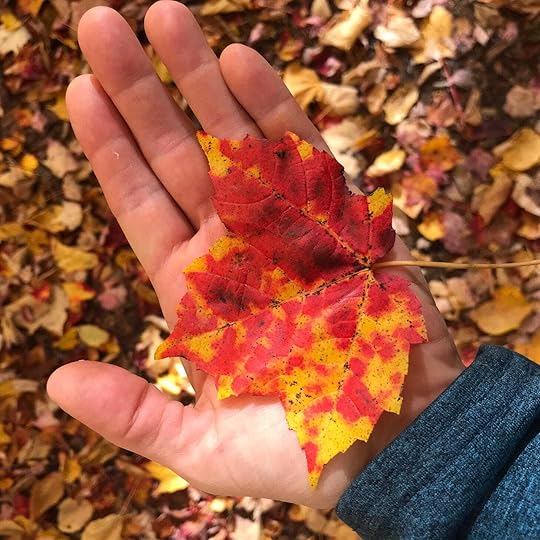 Death!!
Death!!Which brings me back to Charlotte’s Web.
If you only read the book as a child, you might still be under the impression that it’s just a charming children’s story about a girl and a pig and a spider who can, for some reason, read.
I mean, it is that. But, as I discovered when I read it to my own children nine or ten years ago, it’s also about the cyclical nature of life. It’s about birth and death and love and loss. It’s about anticipating and remembering. It’s about growing up.
At the beginning of the story, Fern, the little girl who convinces her father not to kill Wilbur, the runt of the new pig litter, is enthralled by the animals of the farm. By the end of the book, she’s more interested in a boy.
Near the beginning of the book, Wilbur learns that he’s destined for the slaughterhouse. Charlotte saves his life, but in doing so hastens her own death. Wilbur will never be eaten, thanks to his new celebrity status, but he will, of course, die eventually.
In the meantime, though, there are Charlotte’s children and grandchildren and great grandchildren, some of whom fly away on their little spider balloons, and some of whom stay in the barn and chat with Wilbur and the other animals. There are goslings and lambs and calves each spring. And although Wilbur may not live to see it, Fern will probably one day have children, too. The cycle continues.
All this, and the prose itself is just gorgeous.
Seriously, get your hands on a copy and read it. Read it to yourself or read it aloud to your children or partner or elderly parent. Read it now, during this season of simultaneous beginning and ending, when the circles are so keenly apparent. (I have no way of knowing for sure, but I have a feeling E.B. White loved the heck out of Fall.)
And if you’re not convinced yet, here, read this, from the very end of the book:
Life in the barn was very good—night and day, winter and summer, spring and fall, dull days and bright days. It was the best place to be, thought Wilbur, this warm delicious cellar, with the garrulous geese, the changing seasons, the heat of the sun, the passage of swallows, the nearness of rats, the sameness of sheep, the love of spiders, the smell of manure, and the glory of everything.
See?
Happy September, and thanks as always for reading.
All posts on Jane’s Calamity are free and publicly available, but writing is how I make my living. If you enjoy my strange brand of Substacking, and/or if you have complex feelings about spiders, please consider upgrading to a paid subscription. Or, hey, maybe buy my book!

August 22, 2024
Menopause, mansplained.
I’m not gonna lie. Sometimes it is hard to come up with ideas for what to write about on this here Substack, and keep up with my breakneck pace of 1.7 average posts per month. But every once in a while a little something is dropped into my lap by the universe—or, in this case, into the mail by a friend—and, voila, a post is born.
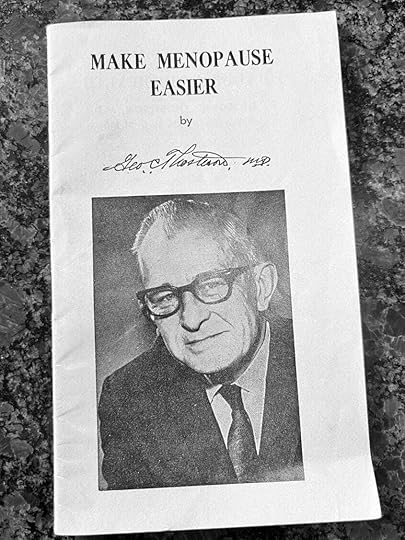
I knew before I even cracked this puppy open it was going to be a treasure trove. Just look at that benevolent, 60-something male doctor there on the cover in his Mad Men glasses, smiling reassuringly at us as menopausal gals if to say, “You’re welcome.”
I was initially a little puzzled by the title, “Make Menopause Easier,” especially given that all other titles in this series by the author, George C. Thosteson, M.D. (in collaboration with Jack Pickering), have a very clear “how to” vibe. They include:
DON’T LET DIVERTICULOSIS THROW YOU
CONTROL YOUR CHOLESTEROL SENSIBLY
YOU CAN STOP SINUS TROUBLE
HIATAL HERNIA AND EIGHT WAYS TO COMBAT IT
and
THE PESKY PROSTATE (that’s not so much a “how to” title, but I obviously had to include it.)
Whereas “Make Menopause Easier” sounds more like a plea to the gods.
I think what the title means is “Make menopause easier on yourself.” Because this is exactly what George C. Thosteton explains how to do. Specifically by not getting all bent out of shape about it.
As he explains on page 6:
“A lesson to be taken to heart is to refuse to be panicked by the ‘scare stories’ told by women who relate (and sometimes magnify) the troubles they had, and assure you that you are bound to experience the same thing…. Remember that the menopause is a perfectly normal change in the human system which every woman, if she lives long enough, must encounter. Women have been going through it since the beginning of human history. Our grandmothers got through it—and our ancestors for thousands of years before them.”
Got that? The Menopause is not a big deal. Just relax. Your grandmother did. And the cave women. Also? Smile. You look so much prettier when you smile.
Dr. Thosteton does, however, concede, that a severe hot flash, for example, can be disturbing.
“A severe flash my persist for five or sometimes 10 minutes, with such sweating that the sufferer is ‘wringing wet.’ This certainly is not pleasant. It can, if you don’t know about it in advance, even be scary. It certainly does nothing to enhance your usual calm demeanor!”
(And your usual demeanor IS calm, isn’t it? ISN’T IT?)
Speaking of which: If you buy into the misconception that you are “in danger of losing your mind” or “helplessly doomed to be cross and crabby” on account of the menopause, let Dr. T you straight:
“I concede that the discomforts and annoyances of menopause may make you feel snappish, but so can a cold in the head, an upset stomach, a sore toe, or a boil on the back of your neck…. The first rule of getting through menopause with the least discomfort is to understand it, accept it as a perfectly normal phenomenon, and let your doctor prescribe medication if you need it.”
He then goes on to say that a mild sedative or horse tranquilizer might help.
Sorry, not a horse tranquilizer. Just a regular one.
In the good doctor’s defense, I assume not as much was known about the connection between hormones and moodswings and depression back in 1971 when this was written. (Holy shit I cannot believe this was written three years before I was born I am so old.)
So maybe we should forgive him for saying things like, “We are likewise fooling ourselves (and families) if we use the menopause as an excuse to be grumbling and irritable. Yes, there will be some feeling of being uncomfortable, but treat it like any other of the discomforts that we must all encounter at one time or another in our lives.”
On second though, no. Let’s not forgive him.
Especially since the next thing he says is: “Do not make the mistake of becoming careless about your personal appearance. Take the same pains you would have taken a few years before to keep your figure and your interests.”
He really does know how to MAKE MENOPAUSE EASIER doesn’t he??
Oh. And in case you were wondering: vaginal itching and dryness *might* be related to the menopause. However: “I most certainly do not imply that it happens to all women, or even to most. It is the exception. It can be easily treated….the one way NOT to get rid of such trouble is to say, ‘Oh, it’s the menopause!’ Entirely too many things are blamed on menopause when, in reality, they are independent of it and could easily be corrected.”
Translation: No more using the menopause as an excuse not to have sex with your husbands, ladies!
Also, menopause doesn’t cause weight gain. As Dr. T explains, “Other factors do. We slow down physically in the 40’s. We don’t get as much exercise. We get more rest. Often we eat (and perhaps drink) more. So we put on weight…. We are only fooling ourselves if we blame it on ‘the menopause.’”
Again, Dr. T and his colleagues probably didn’t know as much as we know now about the connection between weight gain and dropping levels of estrogen, so I am willing to cut him a little slack on this point. Especially because look at this nice little bone he throws to us in answer to the question of whether the menopause causes women to become less attractive:
“Femininity and attractiveness are not sacrificed because of menopause, and if you will take note, there are actresses and other women who remain extremely attractive and beautiful although past menopause age.”
Well, thank GOD.
Actresses. They’re just like us.
 Jennifer Aniston, age 55. If she can look this good after menopause, you have no excuse not to. Bet she has a calm demeanor, too.
Jennifer Aniston, age 55. If she can look this good after menopause, you have no excuse not to. Bet she has a calm demeanor, too. And, if you were wondering what effect menopause might have on your sexual desire—assuming you don’t have ALMOST DEFINITELY NOT RELATED, SILLY vaginal itching—there’s more good news:
“As a matter of fact, many women become more receptive to sexual activity after menopause because they can put out of their minds the fear of becoming pregnant.” (HINT, HINT, Mrs. Doctor Thosteton!)
See? Menopause really isn’t that bad. Hot flashes and night sweats and vaginal dryness and a thickening middle and decreased collagen production (and the resulting jowls) and moodswings and the end of your fertility and everything it represents—they’re just a normal part of life. Accept them. Dress nicely. And keep having sex with your husband.
Or, as Dr. George C. Thosteton, M.D. says:
“Menopause is a natural phase in a woman’s life. Whereas adolescence is the beginning of her child bearing potential, menopause is the end, but not the end of living, charm, or femininity. Menopause is not to be feared, because it is inevitable.”
Glad we got that cleared up.
All posts on Jane’s Calamity are free and publicly available, but writing is how I make my living. If you enjoy my work, please consider upgrading to a paid subscription, or buying my latest book (in which perimenopause is a major character.) Thank you!
And on another note completely: I’m excited to share that I’m starting to actively (re)build my creative coaching and editorial business. If you or someone you know is looking for accountability, guidance, and feedback as they write a book, or has a completed manuscript (or shorter pieces) they’d like to have reviewed / edited by a Published Author (tm) and writing instructor with a degree from a fancy MFA program, please feel free to contact me at janeroper@gmail.com to discuss!
P.S. Here’s some more terrific stuff that George C. Thosteson, M.D. has to say.



August 1, 2024
Hey, maybe I don't need a poem after all.
Well damn. Last time I posted, I was pleading for a poem to get me through the sh*t show of the presidential election, the insanity of recent Supreme Court rulings, the ongoing popularity of a certain weird wannabe dictator, and the creeping fascism here and abroad.
But now—wow. Here I am, a few weeks later, feeling actually HOPEFUL. Energized! Pumped!
And extremely relieved.
Ever since the disastrous presidential debate back in June, I’ve been firmly on team “Love You Biden, But You Gotta Drop Out”—as were many, many other people I know. (It wasn’t just the New York Times and “elites,” my friends.) I knew that if he withdrew, no matter who the replacement candidate ended up being, it would unleash a surge of hope and energy and momentum.
But even with all the pushback Joe was getting, it still felt like he would never back down. It would just be too big, too unprecedented. Too ACTUALLY GOOD NEWS. Hence me writing mournful meta-poetry on Substack.
Shortly after I did that, my husband and took off to spend some time by a lake in New Hampshire (the place with the wildlife). I was feeling so demoralized and discouraged that I vowed to ignore the news and social media completely. I would just focus on reading books, swimming, hiking, drinking wine, and drinking wine.
But then, on our first full day, just as we reached the top of a little nearby mountain on a late morning hike, our phones started blowing up with texts, and everything changed.
Biden dropped out!
OMG! He’s out!
IT HAPPENED
A few minutes later—after some brief return texting and news-looking—we snapped the below selfie. Look how simultaneously thrilled and terrified we look!
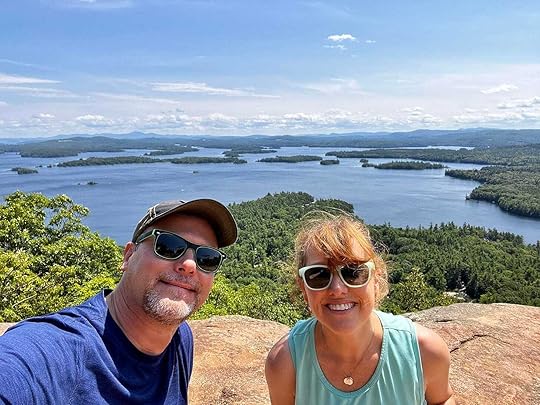
OK, maybe just thrilled. (With that view, how could we not be?) But we were definitely a little anxious on the inside. Because what would happen now? How? When? Who? Would the Dems manage to keep it from becoming the sort of circular firing squad clusterf*ck they so excel at? Would progressives and moderates start bare-knuckle boxing in the streets?
But within hours—minutes?—it was clear that Kamala was going to be the candidate. And instead of people freaking out and being all “She can’t win! She’ll be a terrible candidate! We’re doomed if she runs!” as so many people had been saying for so long (I confess, I was one of them), suddenly it was just: LET’S GOOOOOOOO!!!! 🥥🌴🥥🌴🥥🌴🥥🌴🥥🌴🥥
It’s been that way ever since. And I am fucking loving it.
Look, I’m not naive enough to think that the forces of MAGAism and Christofascism and all the other bad -isms will be defeated in November, or ever. But for the moment, I’m feeling a whole lot better about things—and I suspect a lot of you reading this feel the same way.
So perhaps you, like me, no longer feel quite as desperate for poetry. Or inclined to write it yourself.
Speaking of which: I must say, it was unexpected and sort of delightful and fun that many people (including some actual poets!) thought that that thing I wrote *did* in fact count as a poem.
Then again, there was a brief time in my life—specifically, the year that Where the Sidewalk Ends came into my life—when I wrote copious amounts of poetry. Behold, my first (and only) chapbook, Over The Rainbow ©1981
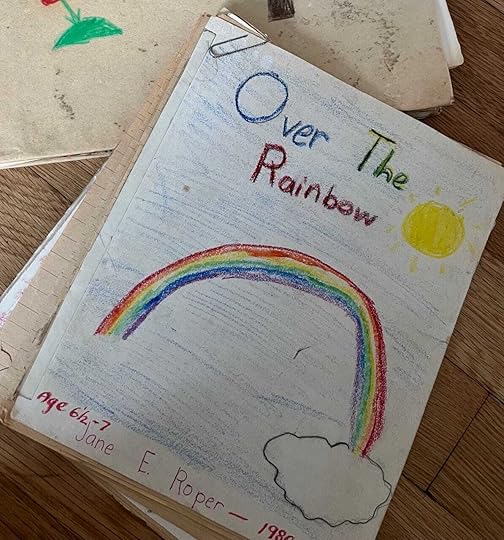
And two poems from it, which showcase my immense range—from paens to rainbows, hearts, unicorns and other Lisa Frank fodder, to wholesale ripoffs of Shel Silverstein poems.
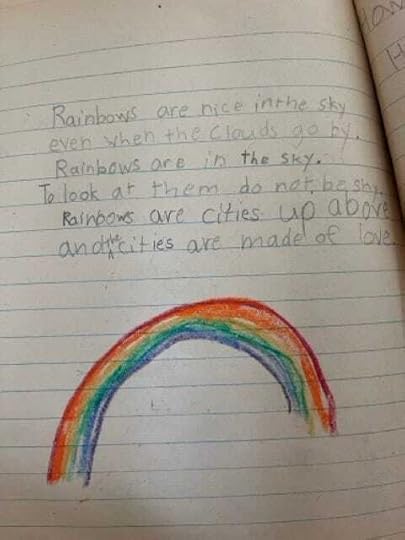 Note bold choice to repeat “in the sky.”
Note bold choice to repeat “in the sky.”
 My line breaks definitely needed some work.
My line breaks definitely needed some work.Anyway.
November—and the future of America—may still end up being a sh*t show. Meanwhile, war is still raging and the planet is still warming and AI is still, eventually going to kill us all. But at least there’s a little more hope in the mix.
Here’s a poem by an actual poet that I think sums that sentiment up pretty well.
ThanksBY W. S. MERWIN
Listen
with the night falling we are saying thank you
we are stopping on the bridges to bow from the railings
we are running out of the glass rooms
with our mouths full of food to look at the sky
and say thank you
we are standing by the water thanking it
standing by the windows looking out
in our directions
.
back from a series of hospitals back from a mugging
after funerals we are saying thank you
after the news of the dead
whether or not we knew them we are saying thank you
.
over telephones we are saying thank you
in doorways and in the backs of cars and in elevators
remembering wars and the police at the door
and the beatings on stairs we are saying thank you
in the banks we are saying thank you
in the faces of the officials and the rich
and of all who will never change
we go on saying thank you thank you
.
with the animals dying around us
taking our feelings we are saying thank you
with the forests falling faster than the minutes
of our lives we are saying thank you
with the words going out like cells of a brain
with the cities growing over us
we are saying thank you faster and faster
with nobody listening we are saying thank you
thank you we are saying and waving
dark though it is
All posts on Jane’s Calamity are free and publicly available, but writing is how I make my living. If you enjoy my work, please consider upgrading to a paid subscription, or buying my poetry-free novel. Thank you!

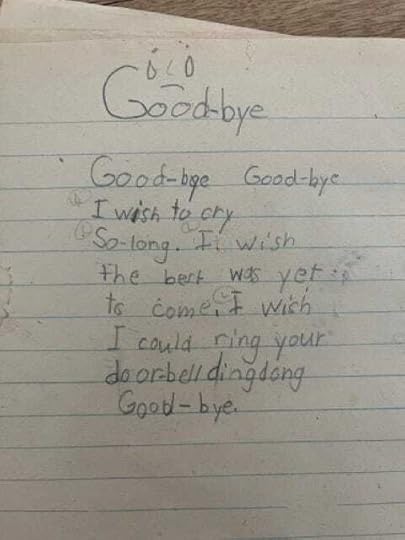
July 17, 2024
I need a poem to get me through this sh*tshow
By Jane Roper, non-poet
.
I need a poem
about resisting despair
when the world feels like
a knife in my kneecap
or a boulder in my shoe
or a hot cast-iron skillet on my forehead
or some other very unpleasant thing.
.
I am not a poet
clearly.
I can, however, make
line breaks
to trick you
into thinking that this
is a poem.
It is not a poem.
OR IS IT?
.
I need a poem
by Maya Angelou or Mary Oliver or Richard
Blanco
or any halfway decent poet, really.
I’d even take an MFA student.
I need a poem about how there is succor to be found
in the scything wings of the swallow
and the daisy’s hopeful countenance.
You know. That sort of thing.
But better.
Much, much better.
.
I need a poem
with a repeating line, like “I need a poem,”
to rock me like a cradle while this dumpster fire burns.
But with way better similes than “rock me like a cradle”
And probably no mention of dumpster fires
either.
Definitely nothing about the distant bang of boots and bullets,
or bleeding wombs.
It’s just too much alliteration. And horror.
.
I need a poem
that will kindle resolve
in the tinder of my tender heart.
Hey, that sounded nice just then—
the consonance, the internal rhymes.
But probably overkill.
Sorry.
.
Maybe I need a poem
with a variant on that repeating line
and a reminder that the osprey
also fear the specter of fascism
but you don’t see them freaking out about it, do you.
Be like an osprey, I want this poem to tell me.
An osprey that votes, and writes letters, and steadily builds
its heaven-high nest
instead of freaking the fuck out.
.
I need a poem
that will exhort me to be like the sun
which daily insists on obliterating the darkness,
like a daisy’s hopeful countenance.
Ha ha. Call back.
.
Seriously, though, I need a poem.
Shouldn’t there be one going viral right about now?
Amanda Gorman, where are you?
HELP.
.
I need a poem
to get me through this shitshow
and I suspect that you do,
too.
.
I’m sorry.
I’ve got nothing.

All posts on Jane’s Calamity are free and publicly available, but writing things (other than poetry) is how I make my living. If you enjoy my work, please consider upgrading to a paid subscription, or buying my book. (Below.) Thank you!

July 8, 2024
Captain Von Trapp and I are deeply concerned
Our extended family got back last week from the trip of a lifetime: a cruise on the Danube, from Budapest, Hungary to Vilshofen, Germany.
 The Hungarian parliament building at sunset
The Hungarian parliament building at sunsetIt’s not the sort of travel we normally do. We’re more DIY-types—guidebooks, not guided tours; crashing with friends or renting Airbnbs, not staying in places where turndown service is a thing. Meanwhile, I am not a big fan of boats, as I like having the option to leave any given place at any given time, which is not possible when you’re surrounded by water. However, due to the specific health needs of various family members, and thanks to great generosity on the part of my in-laws, we opted for a river cruise.
It was decidedly weird to be traveling in such a cushy way. (Note that “Cushy” would also be a good way to describe my stomach and thighs right now, in spite of the best efforts of Milosz, the slightly scary Serbian fitness director on the cruise.) But it was also decidedly fucking amazing. And as it turns out, being on a boat on a river, as opposed to the ocean, was not that unpleasant at all for claustrophobic, boat-averse me. In fact, it was quite lovely.
(Aside: Best boat-related quote of the trip was from my kiddo Elm, upon entering the lobby. “There’s a chandelier here? The only other time I’ve seen a chandelier on a boat is on the Titanic.”)
 Fancy shmancy! (Chandelier not pictured) My love of fans persists.
Fancy shmancy! (Chandelier not pictured) My love of fans persists.But the river cruise life is not I’m here to write about. What I’m here to write about is history: the undercurrents of it that I felt running throughout the whole trip, and my awareness of its echoes in our present day.
Of course, being more cognizant of the long sweep of human history isn’t unexpected when you visit places where, for example, an abbey built in 1410—which got a trendy baroque makeover in 1710—isn’t the oldest attraction in town. That would be the ruins of the castle built in 1130, where King Richard the Lionheart was once held captive for ransom.
 In Dürnstein, Austria: ruins up above, Grüner-Veltliner grapes below.
In Dürnstein, Austria: ruins up above, Grüner-Veltliner grapes below.As I’ve written in the past, I sometimes find it comforting to remember just how long the course of human history is. Oceans rise, empires fall, etc. It helps put the drama of the day in perspective—assuming that drama isn’t, you know, actively destroying your life.
But on this trip, thinking about the Romans and the Visigoths and all those nutty Habsburgs didn’t do much to ease my current worries with regard to the state of the world—specifically the rightward way the political pendulum is swinging in the U.S. and Europe. Or the way a lot of people seem to want it to swing, anyway.
As we made our way up the Danube, I felt keenly attuned to Europe’s much more recent history: the rise of fascism in the 1920s-1940s, the victims it claimed, and the millions who stood by while it all happened, unable or unwilling to stop it. Meanwhile, we were getting the news from back home, where the conservative-packed Supreme Court was doing lovely things like making it legal to jail homeless people, weakening the regulatory powers of the EPA and SEC, and, oh yeah, ruling that the president has immunity for criminal acts committed while in office.
Not a great combo.
Sorry, you expected a fun travelogue, didn’t you. I’m afraid my heart is a bit too heavy for that. But let’s take a brief break here for a fun picture, taken in a public restroom in Vienna.

Good? OK. Back to politics.
One of the most unsettling moments of the trip for me was when we happened upon a monument in Budapest erected ten years ago by the government—Trump’s buddy Viktor Orbán’s government, specifically—commemorating the victims of the German occupation of Hungary during World War II. Actually, what I saw first was not the monument itself, but the makeshift memorial and signs of protest in front of it.
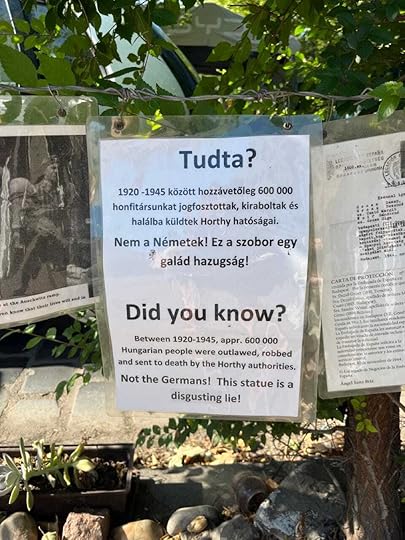
The reason for the controversy around the monument—which depicts the archangel Gabriel, a symbol of Hungary, being attacked by an eagle representing Germany—is that it implies that Germany that was solely responsible for the mass deportation and killing of Hungarian Jews, gays, Roma and others during the war.
The reality is that for years before the Germans came on the scene, the Hungarian government was actively persecuting Jews with forced labor, anti-semitic laws, deportation, and worse. And when the Nazis occupied Hungary, the Hungarian government and its military and police forces actively, willingly aided in the killing and deportation of Jews and others. (This was also part of the plot of the historical movie I inexplicably tortured myself by watching on the plane ride home, The Zone of Interest.)
To look at that monument, though, you’d never know the truth.
This is what autocratic leaders like Orbán and their political cronies do. They use misinformation, propaganda, half-truths, and revisionist history to advance their agendas, and (often) create an illusion of a perfect past.
They’re also very good at convincing people—and these days it’s easier than ever, thanks to the Internets and assistance from Russian disinformation—that their perfect country is being destroyed by immigrants and radical leftists and feminists and LGBTQ people. Take it back! they say. Make it great again!
 A more truthful monument, elsewhere in Budapest: Shoes on the Danube Bank, representing the thousands of Jews who were shot into the Danube by Hungary’s fascist Arrow Cross party militiamen in 1944-45. They were made to remove their shoes, which were valuable, before they were murdered. The sign at the monument, however, still says only “victims.” It doesn’t acknowledge that they were all Jewish.
A more truthful monument, elsewhere in Budapest: Shoes on the Danube Bank, representing the thousands of Jews who were shot into the Danube by Hungary’s fascist Arrow Cross party militiamen in 1944-45. They were made to remove their shoes, which were valuable, before they were murdered. The sign at the monument, however, still says only “victims.” It doesn’t acknowledge that they were all Jewish.Remember that part about Trump being an Orbán fanboy? It’s not just Trump; it’s a broad swath of people and thinkers and politicians on the extreme right in the U.S., including the Heritage Foundation. Their vision for America, as laid out in a little thing called Project 2025 that you may have heard of, is very much inspired by Orbán’s vision for Hungary. According to Heather Cox Richardson, Heritage Foundation president Kevin Roberts has has called modern Hungary “not just a model for conservative statecraft but the model.” In 2023, the Heritage Foundation formed a formal partnership with Hungary’s Danube Institute, a state-funded right-wing think tank.
I recommend reading Cox Richardson’s entire recent post on the topic of Project 2025 and the Hungary connection, but in the meantime, at least read this paragraph. Wait, no. First, take a breather and enjoy this picture of my daughter posing next to a little statue outside a bakery in Bratislava, Slovakia, that’s supposed to look like a traditional pastry they sell, but that actually looks like…well. Not a pastry.

Ha ha.
Back to Heather Cox Richardson:
“As soon as [Orbán] retook office in 2010, he began to establish control over the media, cracking down on those critical of his far-right political party, Fidesz, and rewarding those who toed the party line. In 2012 his supporters rewrote the country’s constitution to strengthen his hand, and extreme gerrymandering gave his party more power while changes to election rules benefited his campaigns. Increasingly, he used the power of the state to concentrate wealth among his cronies, and he reworked the country’s judicial system and civil service system to stack it with his loyalists, who attacked immigrants, women, and the rights of LGBTQ+ individuals. While Hungary still holds elections, state control of the media and the apparatus of voting means that it is impossible for the people of Hungary to remove him from power.”
Could this happen here? Yup, that’s the plan. And parts of it are well underway.
Look, I don’t tend to be an alarmist. I don’t think we’re headed for all-out fascism, or another Holocaust-like event. But I’m deeply worried about what’s ahead for America, and especially for its most vulnerable citizens, including my own genderqueer kid (not pictured), if Trump takes the presidency for a second time. I worry about crackdowns on freedom of the press and protest. I worry about the draconian measures that may be taken with undocumented immigrants. I worry about women’s reproductive freedom being even further curtailed. I worry about the social safety net being gutted. And I worry about our country becoming a place where elections don’t matter.
I’ll end with this: One of the highlights of our trip was a full-day Sound of Music tour. (Anyone who knows me, or who has read this Substack for any length of time knows that The Sound of Music is one of my favorite things. See what I did there?) The scenery was stunning, and it was super fun to see the hills and landmarks where Maria and the Von Trapp children frolicked on screen.
 Clio wore her very-reminiscent-of-the-drapes dress—a killer T.J. Maxx find—for the occasion.
Clio wore her very-reminiscent-of-the-drapes dress—a killer T.J. Maxx find—for the occasion.
 I mean, I had to do it.
I mean, I had to do it.But as we tooled about Salzburg and environs, there was a particular scene from the movie I just couldn’t get out of my mind. It’s the one where 17-going-on-18-message-boy-turned-Nazi Rolf shows up to deliver Captain Von Trapp the telegram ordering him to report to duty with the Third Reich. After Rolf leaves, the Captain is staring off into the distance, and the Baroness says to him, “You’re far away. Where are you?”
He replies, “In a world that’s disappearing, I’m afraid.”

Oh, Captain, you sexy bastard. I feel you.
But I don’t want to end on that somber note—because there is still time, and there is still hope (good job, France), and there is still work we can all do to keep our country from slipping toward autocracy and Christo-fascism. And along the way—and no matter what happens down the line—we have to keep celebrating the positive and embracing all that’s good and precious in our lives. That includes spending time with family, relishing the beauty in this crazy world, doing squats with Milosz, laughing at poop-shaped pastry mascots, and imbibing delicious beverages.
I feel incredibly lucky to have been able to do all of that and then some last week.
Prost.

All posts on Jane’s Calamity are free and publicly available, but writing is how I make my living, and AI is presently f*cking over my day job. If you enjoy my work, please consider upgrading to a paid subscription or buying my book.




